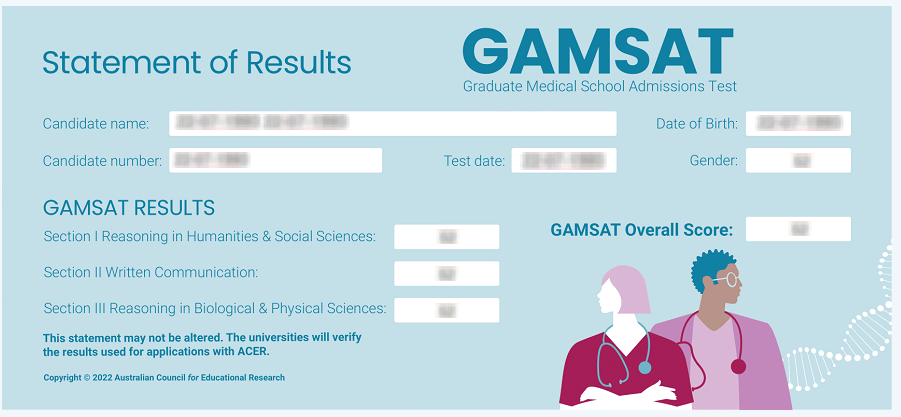How to Prepare for GAMSAT? Steps and Challenges
Preparing for the GAMSAT is a formidable task that demands dedication, strategy, and a deep understanding of the challenges it poses. In this comprehensive guide, we will delve into the various steps to prepare for the GAMSAT and explore the challenges that test-takers commonly face along the way.
Let’s explore the steps to prepare for the GAMSAT effectively.
Related Article: Where to Start GAMSAT? A Comprehensive Guide
Step 1: Establish a Study Plan
One of the most critical aspects of GAMSAT preparation is creating a well-structured study plan. The GAMSAT is not a test you can cram for in a few weeks. It requires long-term, consistent effort. Begin by assessing your current level of knowledge and identifying your strengths and weaknesses in each of the three sections.
Once you have a clear understanding of where you stand, create a study schedule that allocates specific time for each section. Allocate more time to sections in which you are weaker and less time to those in which you are stronger. Set realistic daily or weekly goals to keep yourself on track and motivated.
Step 2: Gather Study Materials
The next step is to gather the necessary study materials. You will need textbooks, practice exams, and other resources that cover the topics tested in the GAMSAT. Popular publishers of GAMSAT study materials include ACER (Australian Council for Educational Research), Griffiths GAMSAT Review, and Des O’Neill’s GAMSAT Preparation.
Additionally, consider using online resources and forums where you can find study guides, practice questions, and discussions with other GAMSAT aspirants. Utilize both printed and digital materials to ensure comprehensive coverage of the test content.

Step 3: Develop Strong Reading Habits
Effective reading skills are crucial for success in the GAMSAT, especially in Section 1, which tests your comprehension and interpretation abilities. To enhance your reading skills:
A. Diversify Your Reading Material
Read a wide range of materials, including newspapers, academic journals, and literary fiction. This will expose you to different writing styles and topics.
B. Practice Speed Reading
Work on increasing your reading speed without compromising comprehension. Time management is crucial during the GAMSAT.
C. Annotate and Summarize
Make it a habit to annotate texts as you read. Highlight key points and summarize passages to improve your retention and analysis skills.
Step 4: Hone Your Writing Skills
In Section 2 of the GAMSAT, you will be required to write essays on various topics. To excel in this section, it is essential to develop strong writing skills. Here are some strategies to enhance your writing abilities:
A. Practice Writing Essays
Regularly practice writing essays on diverse topics. Pay attention to essay structure, clarity of expression, and the ability to construct convincing arguments.
B. Seek Feedback
Share your essays with peers or mentors to receive constructive feedback. Addressing your weaknesses is crucial for improvement.
C. Study Argumentation
Familiarize yourself with principles of argumentation and logical reasoning. Understand how to present and defend a viewpoint effectively.
Related Article: Which Universities Require GAMSAT?
Step 5: Master the Sciences
Section 3 of the GAMSAT requires a solid foundation in the biological and physical sciences. To prepare effectively:
A. Review Core Concepts
Go back to your undergraduate science textbooks and review core concepts in biology, chemistry, and physics. Ensure you have a strong grasp of fundamental principles.
B. Solve Practice Questions
Practice solving science-related questions to improve your problem-solving skills. Focus on complex problems that require critical thinking.
C. Consider a Science Course
If you lack a strong science background, consider enrolling in a science course or hiring a tutor to help you bridge the knowledge gap.

Step 6: Time Management and Practice Exams
Time management is crucial in the GAMSAT. You must complete each section within a specified time frame. To improve your time management skills:
A. Take Practice Exams
Regularly take full-length practice exams under timed conditions. This will help you get accustomed to the pacing required for each section.
B. Analyze Your Performance
After each practice exam, review your performance. Identify areas where you struggled with time management and work on strategies to improve.
C. Develop a Strategy
Create a strategy for tackling each section of the GAMSAT. Decide how much time you will allocate to reading, answering questions, and reviewing.
Step 7: Stay Healthy and Manage Stress
Preparing for the GAMSAT can be mentally and physically demanding. It’s crucial to take care of your well-being throughout the preparation process:
A. Maintain a Healthy Lifestyle
Eat well, exercise regularly, and get enough sleep. A healthy body and mind will help you stay focused and productive.
B. Manage Stress
Utilize stress management techniques such as meditation, deep breathing, or yoga to keep anxiety at bay. Stress can hinder your performance on the test day.
C. Take Breaks
Don’t burn yourself out by studying excessively. Take regular breaks to recharge and prevent mental fatigue.
Challenges in GAMSAT Preparation
While preparing for the GAMSAT, test-takers often encounter various challenges. It’s essential to recognize these obstacles and develop strategies to overcome them.
Challenge 1: Balancing Study with Other Commitments
Many GAMSAT aspirants have to balance their preparation with work, family, or other commitments. Finding the right balance can be challenging, but it’s essential to avoid burnout.
Strategy: Create a realistic study schedule that accommodates your other responsibilities. Prioritize your most important commitments while ensuring you allocate sufficient time for GAMSAT preparation.
Challenge 2: Maintaining Consistency
GAMSAT preparation is a marathon, not a sprint. Consistency is key to success, but maintaining motivation over an extended period can be tough.
Strategy: Set achievable daily or weekly goals to maintain your motivation. Track your progress and celebrate small victories along the way to stay motivated.
Challenge 3: Overcoming Weaknesses
Identifying and addressing weaknesses in your knowledge and skills can be challenging. It’s essential to confront your shortcomings head-on.
Strategy: Regularly assess your performance in practice exams and identify areas where you struggle the most. Devote extra time to these areas and seek help or additional resources if needed.
Challenge 4: Dealing with Test Anxiety
Test anxiety can significantly impact your performance on the GAMSAT. It’s essential to manage anxiety effectively to perform at your best.
Strategy: Practice relaxation techniques such as deep breathing and mindfulness to manage anxiety. Familiarize yourself with the test format through practice exams to reduce test-day anxiety.
Challenge 5: Handling the Pressure of Test Day
The pressure of test day can be overwhelming. Nervousness can affect your ability to think clearly and perform well.
Strategy: Develop a test-day strategy that includes relaxation exercises and time management techniques. Arrive early at the test center to minimize stress on the day of the exam.
Final Words
Preparing for the GAMSAT is a formidable undertaking, but with the right approach, dedication, and effective strategies, you can increase your chances of success. Remember to create a well-structured study plan, gather the necessary study materials, and focus on developing strong reading, writing, and scientific skills. Additionally, be mindful of the common challenges that GAMSAT test-takers face and develop strategies to overcome them.
Ultimately, success in the GAMSAT is not just about knowledge but also about discipline, resilience, and mental preparedness. By following the steps outlined in this guide and staying committed to your goals, you can navigate the challenges of GAMSAT preparation and pave the way for a successful medical career.




